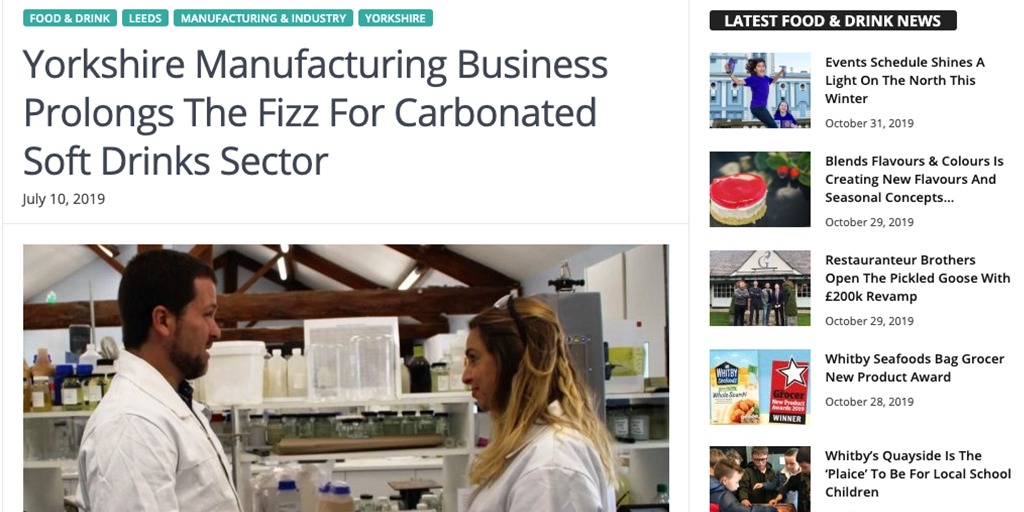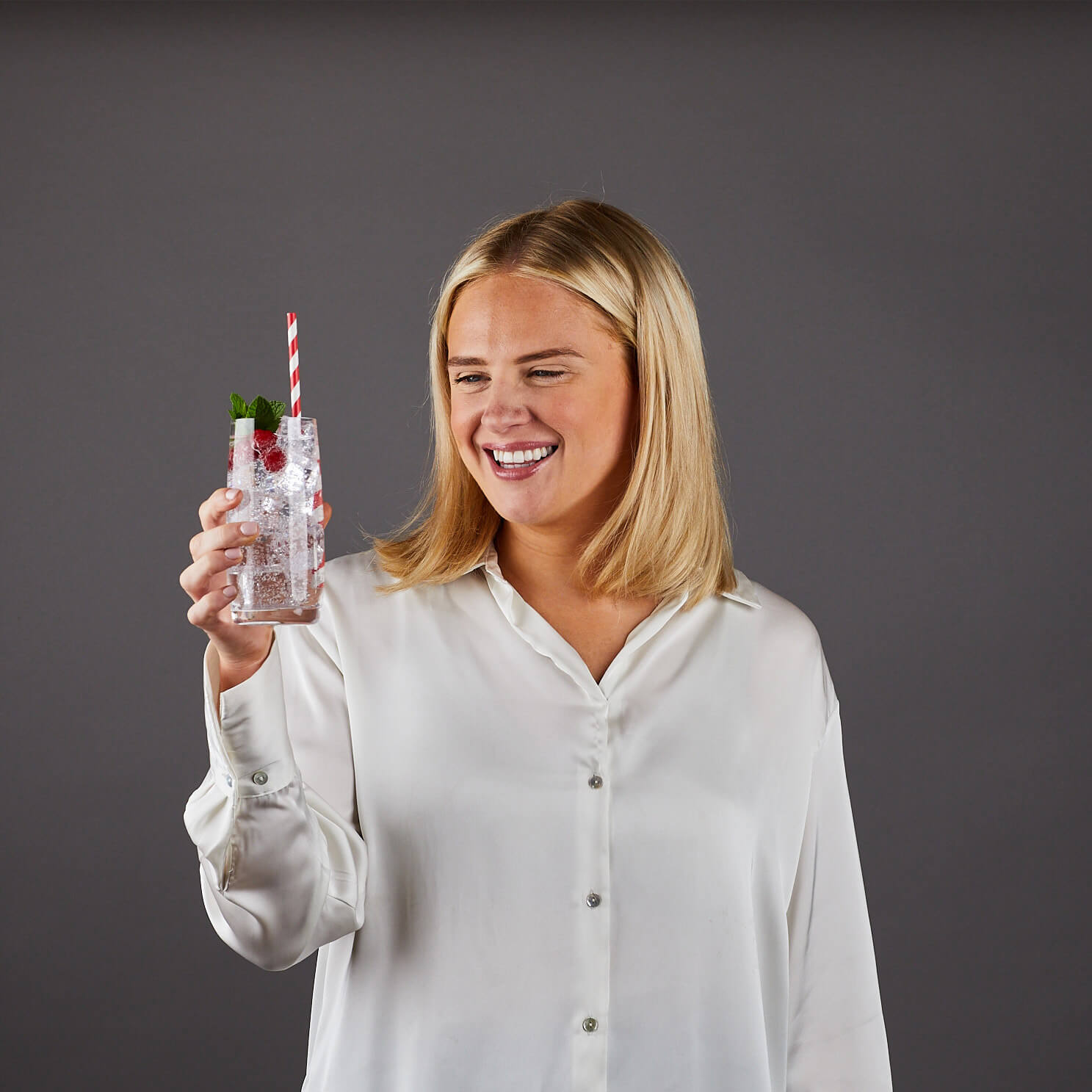The Doncaster business man who is changing the soft drinks sector
Posted in Press Mentions
How bubble technology makes drinks fizzier for longer
With nearly 40 years’ experience in chemistry, John Story is working to revolutionise the worldwide soft drinks industry. Business Editor Mark Casci reports.
John Story places two glasses in front of me. He takes a vial from his desk and squirts a tiny amount of liquid into one of them before filling both with a can of one of the world’s best known soft drink brands.
He urges me to take a sip from each. One is already going flat while the other is extremely fizzy.
Half an hour into our conversation he invites me to take a sip from both again.
The one that was going flat is now completely flat while the glass with his mystery liquid inside is still as fizzy as when he poured it.
The product is CO2Sustain and is now operating as a standalone business having been spun out of Leeds chemical company, the Stephenson Group.
Last summer it was in the headlines when pubs and clubs all over the country ran out of CO2 and draught lagers etc were in short supply during the World Cup.
It uses innovative technology to essentially encapsulate bubbles, preventing them from combining, growing, producing foam and ultimately causing any drink using carbonated water to go flat.
It is selling into 25 different countries and growing at 300 per cent a year with ambitious targets to become a player in the multi-billion pound soft drink industry.
For Mr Story, who has worked in chemicals his entire life, this represents an exciting new chapter. He has visited 25 per cent of all the countries on earth, having been to China 50 times alone. However, his journey into working with global food and beverage giants began in the most quintessential of Yorkshire industries.
Brought up in Doncaster, he was raised in a mining community.
Like many of his friends and family he would initially work in the industry but in his capacity as a chemist, a subject for which he has had a lifelong passion.
“My initial role was a laboratory chemist for British Coal,”
he says.
“I used to go down mines and take samples as we looked for new seams. As happened to most people the mines all closed down, there were no mines so we didn’t need people to analyse coal anymore.”
Fortunately for Mr Story, his skill as a chemist and in business had allowed him to study and work simultaneously.
By the time he was 28 he was a qualified chemist and a chartered manager from the Chartered Management Institute, as well as having 12 years’ experience in the workplace.
He would eventually come to the Stephenson Group in the leafy Leeds suburb of Horsforth, a business which he has spent more than 25 years working with.
A fifth generation family, Mr Story has worked across several different product ranges, including textiles, rubber, paper recycling and soaps.
As diverse as these may be, they have the unifying factor of all involving bubbles, leading him eventually to his current work with CO2Sustain.
The work he does comes at a point of real change for the soft drinks industry, with a pair of factors combining to make the technology the firm has developed increasingly relevant.
“There are things that have happened in the last two or three years that it is really important we are on top of,”
he says.
“For one, the Sugar Tax.
“Typically, drinks were 10 per cent sugar, now it has to be less than five per cent or you have to pay a tax.
“That has made drinks more foamy. It has also slowed productivity but more importantly it has made the drink go flat.
“Then we have obviously had the big issues with plastic. Single use plastic and the user of recycled plastic is becoming a bigger and bigger issue.
“They [soft drink manufacturers] want to use as little plastic as they possibly can and use as much recycled plastic as they can.”
The latter has led to drinks manufacturers employing what is known as lightweighting, i.e. using as little plastic as possible.
However, with thinner plastic bottles coming to market this again has implications for the product’s ability to stay fizzy.
Plastic is porous, not to liquid but to gas. It means drinks can get flatter quickly.
In short, the CO2Sustain technology has an important role to play. Operating in such a global market has required Mr Story and the business to make a lot of changes.
Knowing that its technology could be easily appropriated, a vast amount of work has gone into protecting it.
It has worldwide patents for raw material of product but also for the bubble technology.
Mr Story said:
“It became really apparent that this was a valuable technology and we needed to protect it.
“We needed bullet strong patents. It is got to be strong enough to have your day in court and win and have enough money to do it. If you can’t defend it, it is worthless.
“We are a £25m business We didn’t feel we had the finances so we brought in technology venture capitalists and gave them a share of the company.
“But they had to establish patents and trademarks.
“Now it is all verified by a bubble technology university in Stockholm.”
Moving into the food and beverages sector has meant some practical changes too.
The standards at its Horsforth factory had to be overhauled.
Plus, Mr Story had to build a team that could take it from the laboratory to the marketplace.
“ I am a technical expert, I am not a marketing expert,”
he said.
“This is a business to business product.
“We are all passionate we are all proactive, we have a collaborative team, we all respect each other.
“I am the chief chemist. I help develop these products. My role is to go out to every factory trial. I go with a sales person, it is a combined effort.”
As we speak, Mr Story is set for a several weeks-long trip around the world which will see him visit several countries including South Africa.
A new purpose built R&D centre will be created at the end of the year.
It now has agents across the world and is already operating like a global business.
External investors are on board and, as Mr Story points out, the plan is “to grow this at hundreds of per cent a year”.




